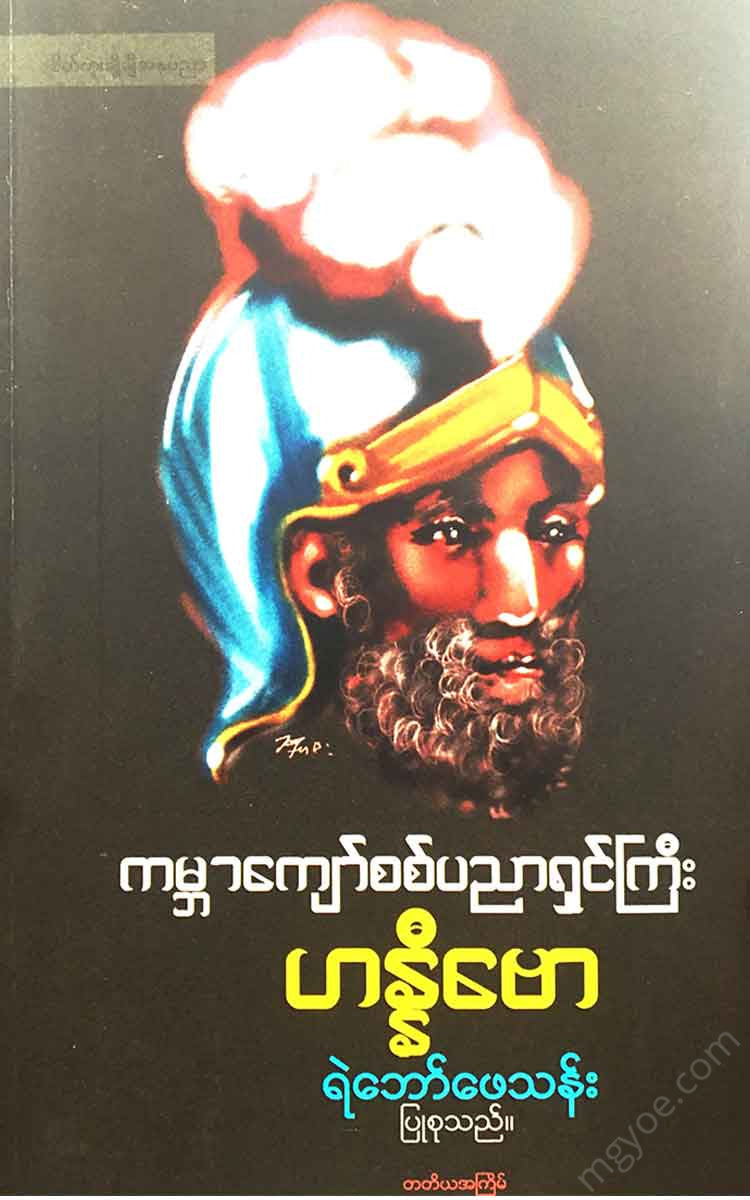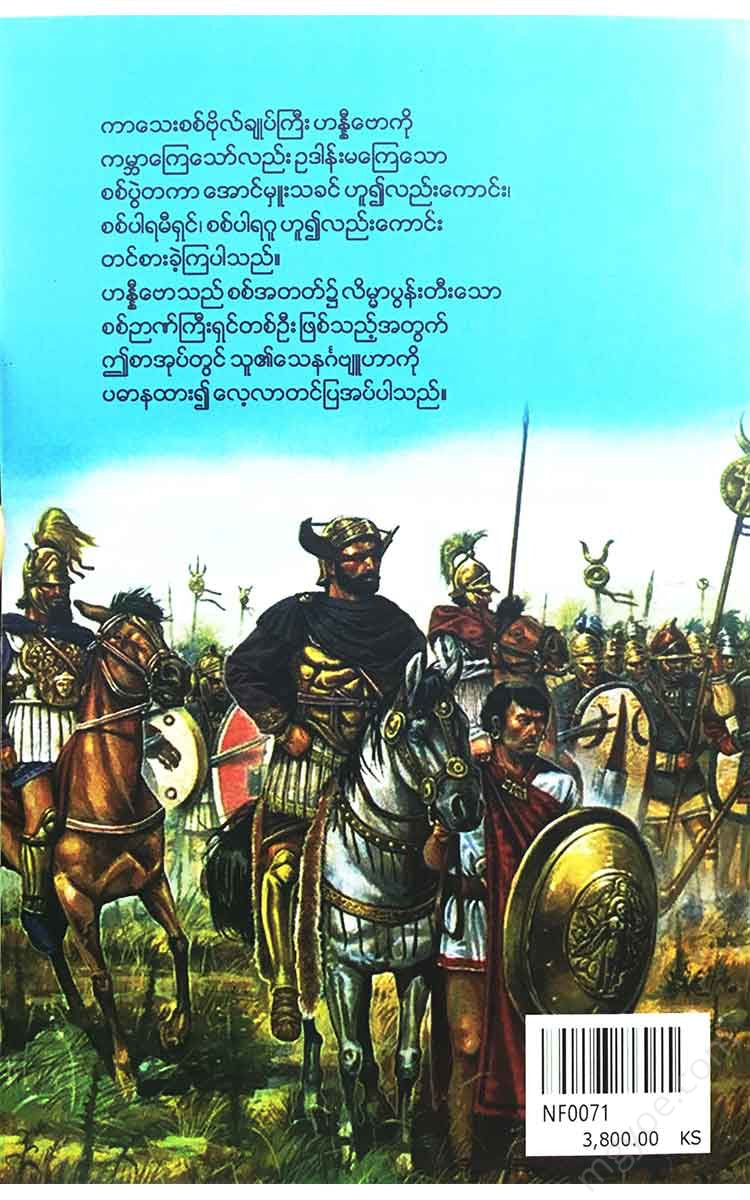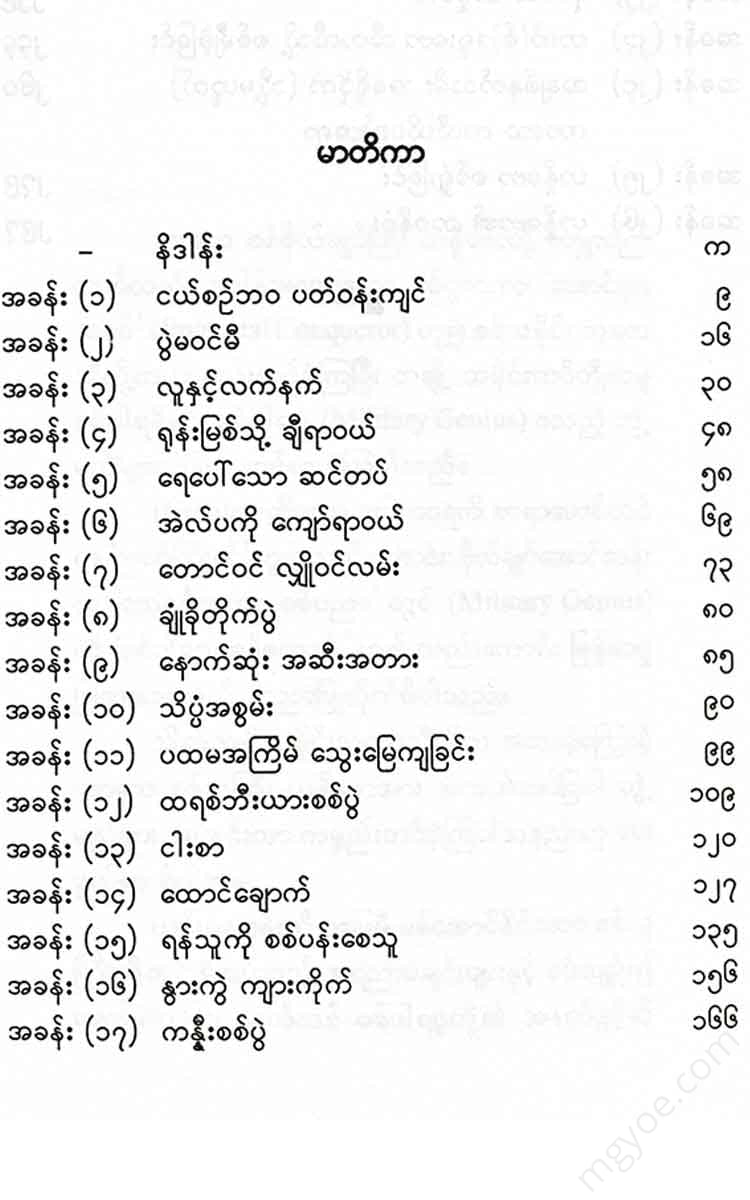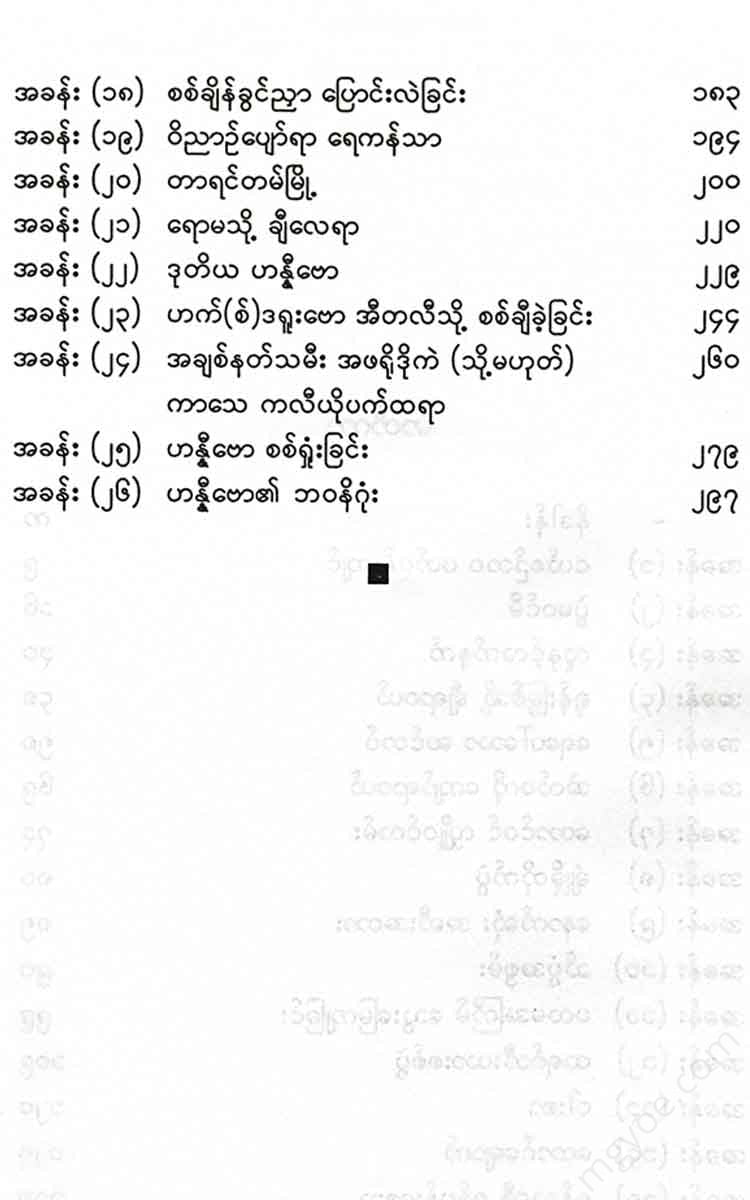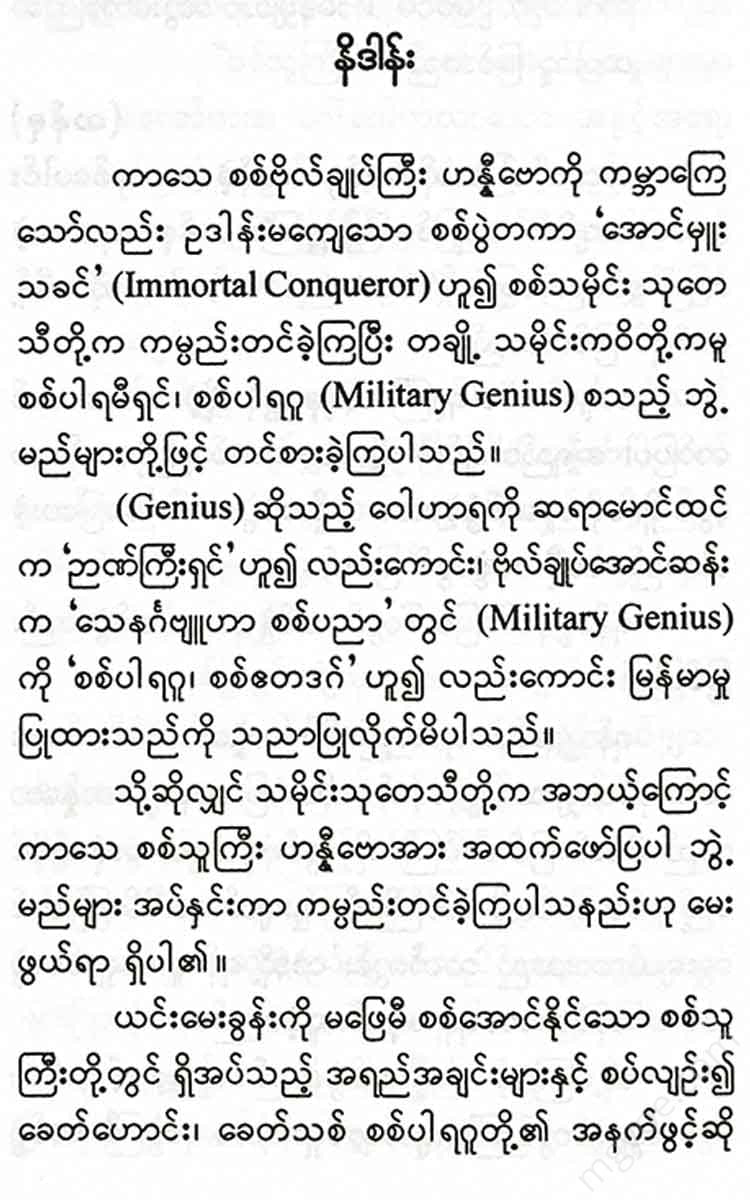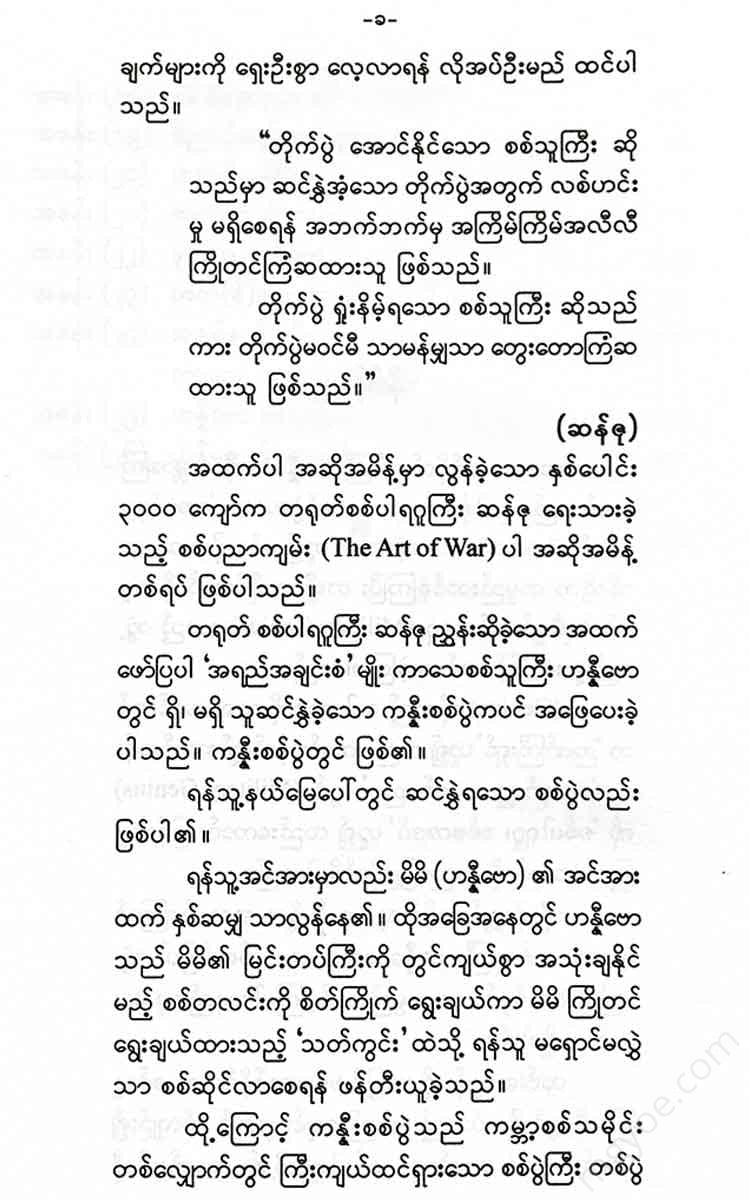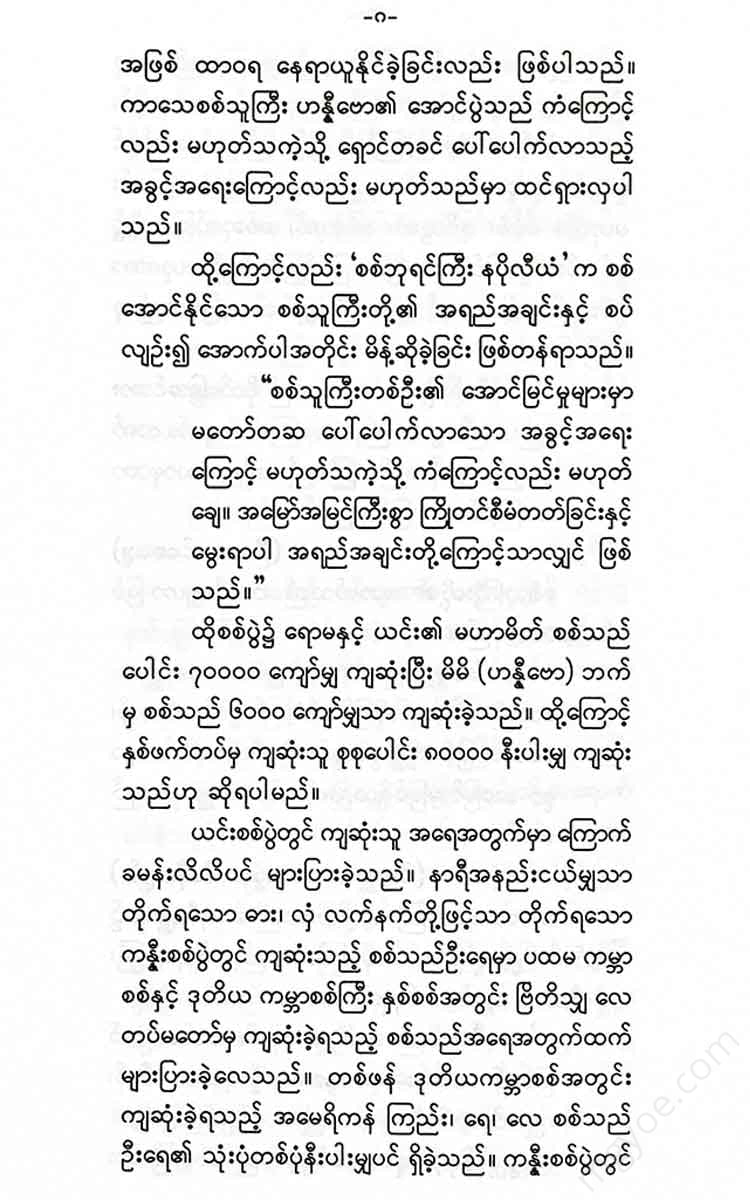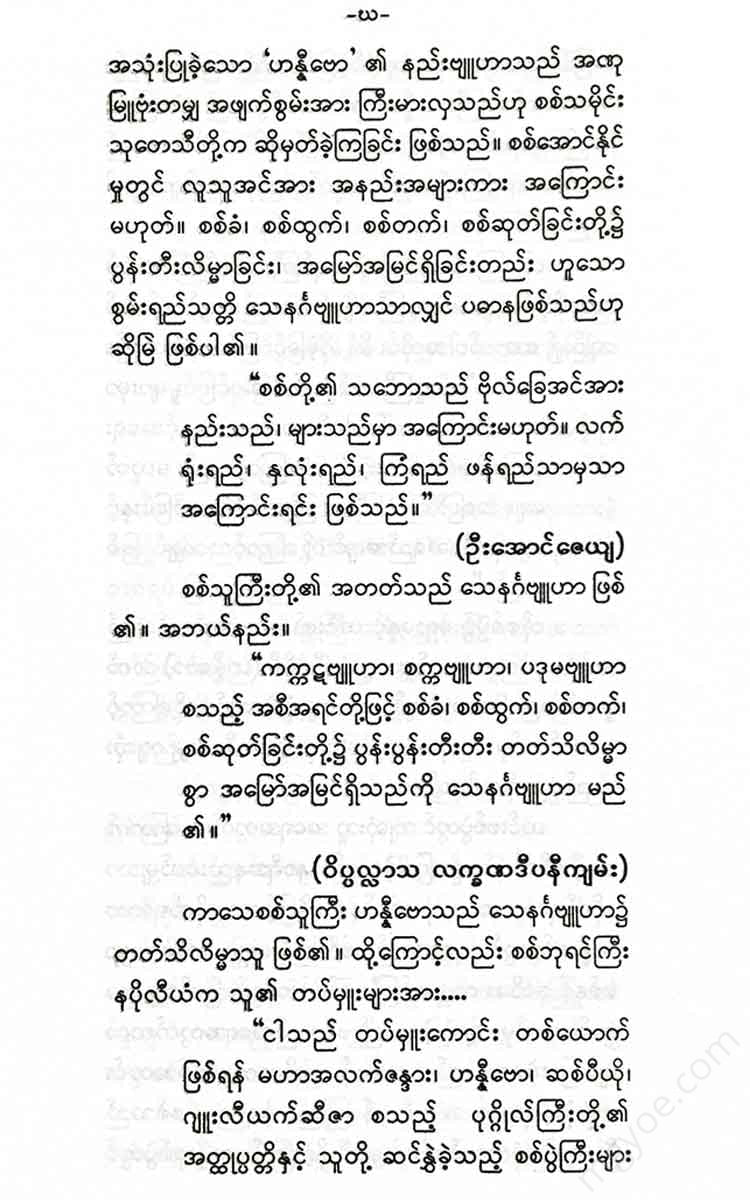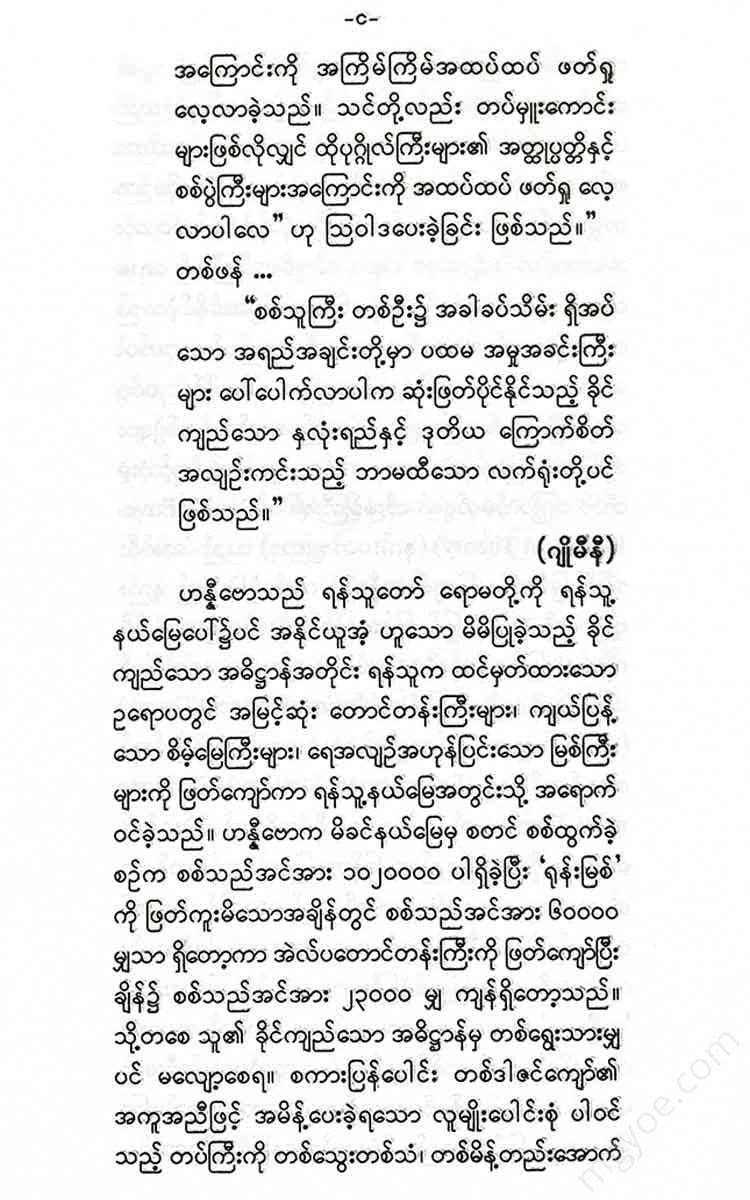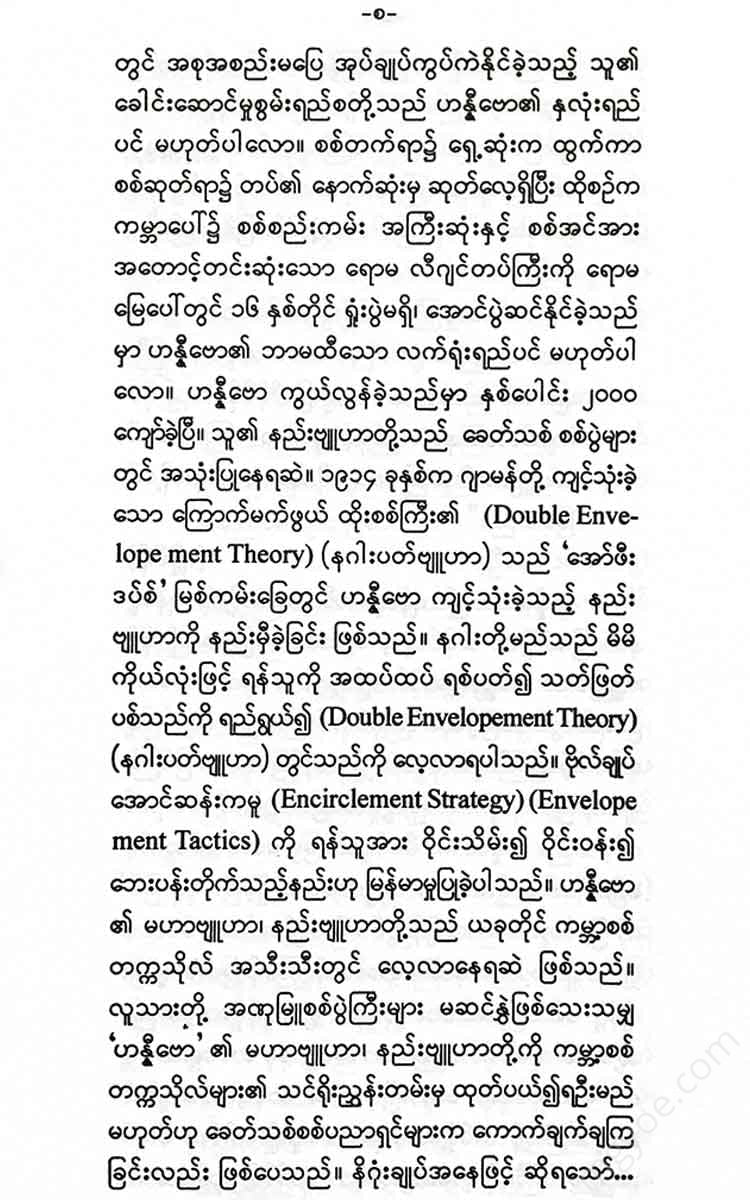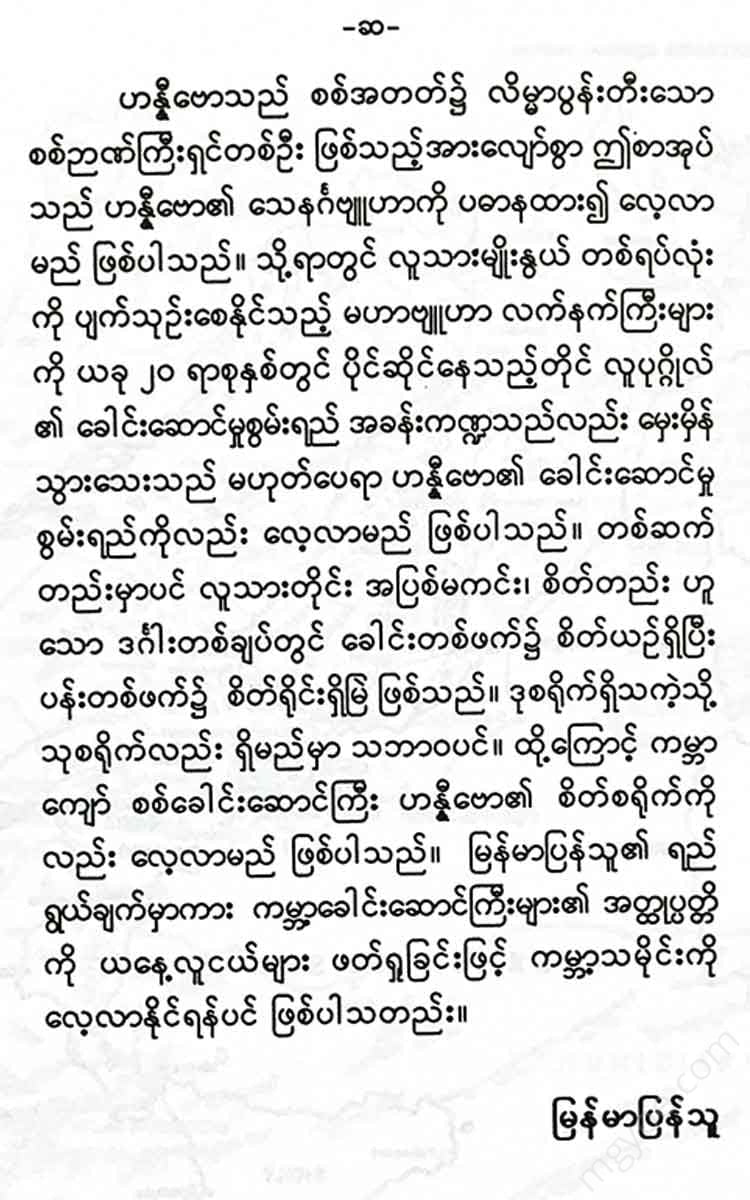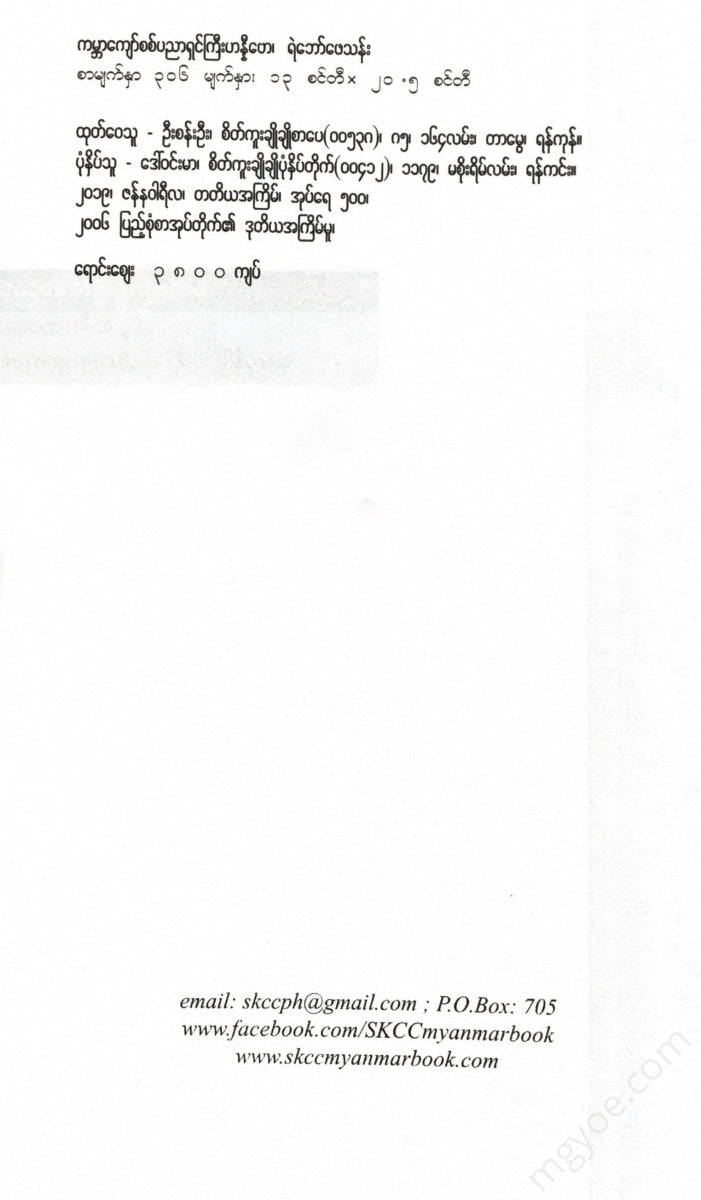စိတ်ကူးချိုချိုစာပေ
Comrade Pe Than - World-renowned military expert Hannibal
Comrade Pe Than - World-renowned military expert Hannibal
Couldn't load pickup availability
Chapter (1)
Childhood environment
When Hannibal was born, Rome was still a developing nation. Hannibal's descendants, the Carthaginians, saw Rome as a new, emerging power that threatened the maritime trade of the western Mediterranean, which they had dominated for centuries.
The Phoenicians, who founded the ancient kingdom of Carthage, were located near modern-day Tunis in North Africa. The Phoenicians were an ancient Semitic people who settled along the eastern Mediterranean coast between Lebanon and the sea. Their major port cities, Tyre and Sidon, are mentioned in the Old Testament.
There was also a major Phoenician port city called “Byblos” or “Byblos.” Byblos means “book” in Greek. Scholars say that the Christian Bible was named after it. Byblos was a major port city that exported papyrus, a type of paper used in the ancient world, to markets around the world.
The industrious Phoenician merchants dominated the maritime trade of the eastern Mediterranean from about 1200 BC, with their numerous cargo ships trading in cotton and rice in ports in Lebanon, Asia Minor, Greece, Italy, Africa, Spain, and the Mediterranean islands.
The Phoenicians were, in fact, merchants by nature, not soldiers. It was from this honest merchant family that Hannibal descended. The Phoenicians had borne the colonial yoke like buffaloes. Since the Assyrians invaded and colonized their homeland in the ninth century, they had never been free from colonial rule. Phoenicia was a small country, a narrow strip of land sandwiched between the Assyrian and Egyptian empires, and was subject to the constant pressure of the great powers. In this situation, a group of freedom-loving Phoenicians settled along the Mediterranean coast, where they had previously dominated maritime trade. Thus, the Phoenicians gradually settled in Cyprus, Sicily, Sardinia, Spain, Malta, and along the coast of North Africa.
Here, tensions arose between the Phoenicians, who were seeking new territories, and the Greeks, who wanted to monopolize maritime trade. At that time, the Greeks were colonizing key port cities to open trading posts, and the Phoenicians, who were by nature merchants, were forced to become fierce warriors by the oppression of the Greeks. In this way, fierce and bitter naval wars broke out between Greece and Carthage for control of the western Mediterranean coast and islands, and for control of Greece and the islands in the region.
Thus, 300 years before the birth of Hannibal, or 500 BC, Carthage had become a powerful and respected state, not just a small kingdom. The Carthaginian captains were excellent in maritime science, and they were able to sail not only along the Mediterranean coast but also into the Atlantic Ocean, reaching as far as the shores of North Africa.
While the conflict over maritime trade with the Greeks was still going on, Rome threatened Carthage from the north. At that time, Rome had not yet grown into a great empire. In the fourth and fifth centuries BC, the Carthaginians saw Rome as a mere Latin state, a peasantry living on the banks of the Tiber River. However, Rome, which the Carthaginians had despised, waged wars of conquest against its neighbors, even expanding into southern Italy. Moreover, Rome was able to establish diplomatic alliances with distant countries and even penetrate the Straits of Messina and Sicily.
At first, the Carthaginians made treaties with their new and threatening enemy, Rome, in 508 BC and again in 348 BC. Under these treaties, Rome recognized the Carthaginians' commercial rights in Sicily. However, there were also grievances over the Greek colonies in southern Italy. In this regard, the Greeks sought Roman help and made war on the Carthaginians. Indeed, the fact that Sicily was closer to Italy than to Africa was a major source of friction between Rome and Carthage. Eventually, Carthage and Rome went to war.
The Carthaginians and Romans fought a war in the mountains, valleys, and bays around Sicily for 24 years. At first, the Carthaginians won some battles, but in 255 BC, the Roman general Regulus (Rigulus) came by sea and landed on the coast of North Africa, causing the Carthaginians to lose the war.
One of the reasons for the defeat of the Carthaginians was the disagreement between the Carthaginian military leaders and the civil administration. The most severe critic of the Carthaginian government was the Carthaginian general Hamilcar Barca.
Hamilcar began commanding the Carthaginian forces in Sicily in 247 BC. That same year, Hamilcar's wife gave birth to a son, Hannibal, who would later become a world-famous military genius. Hamilcar was a skilled general, and he defeated the Romans in land battles. The Romans were also defeated at sea in the early stages of the war. As the war progressed, the Romans realized that the only way to defeat the Carthaginians was to use their naval power. So the Romans marched with their entire fleet and captured the Carthaginian cities one by one throughout Sicily. Eventually, the Carthaginians were forced to sign a peace treaty with the Romans, and Sicily was surrendered to the Romans.
Shortly after the peace treaty, the Carthaginian mercenaries revolted. Taking advantage of this, Rome annexed the nearby islands of Sardinia and Corsica as provinces of the Roman Empire. This meant that Carthaginian ships were no longer allowed to sail into northern Italian waters. The islands of Sicily and Sardinia were also made Roman provinces. This marked the end of the First Punic War. The war left a bitter legacy among the Carthaginian leaders. The Carthaginian general Hamilcar Caravaggio suffered the brunt of this resentment.
Now Sicily had been taken. Corsica and Sardinia had been lost. Only Spain, a well-established colony, remained for the Carthaginians. But there was one thing that could be done. It had to be done with difficulty. That was to invade Italy from Spain. For this purpose the Carthaginian government commissioned its general Hamilcar to send troops and supplies to Spain. This plan had been conceived shortly after the failure of the Roman campaign to conquer Africa.
Hannibal was only nine years old at the time. According to the Greek historian Livy, Hannibal begged his father, Hamilcar, to take him to Spain. Hannibal then went to the temple with his father and vowed to the god Baal that he would defeat the Roman army once and for all.
Regarding the historical events that followed, Marxists concluded that the economy was the source of all events. This conclusion is natural, but it cannot be said to be complete without considering the role of the individual. Here it is worth considering whether a nine-year-old child, having lost the economic war and seeing his father in mourning, would have made such a great decision in the temple. If Hannibal had been an ordinary child, he would have cried for a moment and forgotten everything. If Hannibal had been another ordinary child, the course of history would have been somewhat different.
In any case, even at that time, nine-year-old Hannibal's soul was already developing qualities that neither he nor the world had yet noticed. These qualities were a grudge that could be stored up for a long time in a terrifying way, a spirit that would not be defeated or given up, an organizational ability that could win the love and respect of his soldiers, and an outstanding military skill.
Again, the result of the oath taken in the temple that day was the loss of many lives, the destruction of many great cities, and the collapse of a great empire.
Introduction
The Carthaginian general Hannibal, who was defeated by the world but never defeated, has been called the "Immortal Conqueror" by military historians, and some historians have given him titles such as "Military Genius" and "Military Genius."
I realized that the word "Genius" was used in Burmese by Saya Maung Htin as "Genius", and General Aung San in "The Art of War Strategy" used the word "Military Genius" as "Military Expert, Military Expert".
So, historians may ask why the Carthaginian general Hannibal was given the above-mentioned titles and inscribed on his tombstone.
Before answering this question, I think it is necessary to first study the interpretations of ancient and modern military experts regarding the qualities that a great warrior must possess to be successful in war.
“ A successful general is one who has planned the battle in advance, repeatedly and meticulously, so that there are no gaps in the battle.
"The general who loses a battle is the one who thinks only mediocrely before entering the battle."
( Rice soup)
The above quote is from The Art of War, a book written by the great Chinese military scholar Sun Tzu over 3,000 years ago.
The Battle of Cannae, which he fought, provided the answer to whether the Carthaginian general Hannibal possessed the above-mentioned "qualifications" that the great Chinese military expert Sun Tzu had. It was at the Battle of Cannae.
It is also a war fought on enemy territory.
The enemy's strength was twice as great as his own. In this situation, Hannibal chose a battlefield where he could make extensive use of his large cavalry, creating a pre-selected "killing field" so that the enemy would inevitably come to the battlefield.
Therefore, the Battle of Cannae has become a great battle in the history of world war. It is clear that the victory of the Carthaginian general Hannibal was not due to luck or chance.
Therefore, it is fitting that the "War King Napoleon" said the following regarding the qualities of victorious generals.
“ A general’s successes are not due to chance or luck, but to foresight and innate talent.”
In that battle, Rome and its allies lost over 70,000 soldiers, while Hannibal lost just over 6,000. So the total number of casualties on both sides was almost 80,000.
The number of casualties in the battle was staggering. The Battle of Kandy, fought for only a few hours with only swords and spears, killed more soldiers than the British Air Force in World War I and World War II combined. It was also nearly a third of the number of American soldiers killed in World War II. Military historians have said that the "Hannibal" strategy used in the Battle of Kandy was as destructive as the atomic bomb. It is not the number of men who win a war. It is always said that the most important thing is the ability to defend, to advance, to retreat, and to have the ability to be decisive.
"The nature of war is not determined by the number of troops, but by the strength of the hands, the strength of the heart, the strength of the mind, and the strength of the mind."
(U Aung Zay)
The skill of military commanders is deadly strategy. What?
" Senanga strategy is the one who is skillful and farsighted in defending, launching, advancing, and retreating from war, using strategies such as Kakkata strategy, Sakka strategy, and Paduma strategy."
(Vipallasa Lakkhana Deepani)
The Carthaginian general Hannibal was a skilled strategist. That is why the great warlord Napoleon instructed his commanders...
" To become a good commander, I have repeatedly read and studied the biographies of great men like Alexander the Great, Hannibal, Scipio, and Julius Caesar, and the great wars they fought. If you also want to become good commanders, you should also read and study the biographies of these great men and their great wars," he advised. Again..
" The two qualities that a general must always possess are, first, a strong heart capable of making decisions when great matters arise, and, second, a fearless arm that is fearless."
( Jomini)
Hannibal, determined to defeat the Romans on their own soil, crossed the highest mountains in Europe, vast plains, and raging rivers, and entered the enemy's territory. Hannibal had set out from his homeland with 1,020,000 soldiers, but by the time he crossed the "Rhine River," he had only 60,000, and by the time he crossed the Alps, he had only 23,000. However, his determination was not to be diminished by even a single soldier. Wasn't his leadership ability, which allowed him to command a large army of various nationalities with the help of more than a dozen interpreters, under one command, a single voice, and a single command, the essence of Hannibal's heart? Hannibal, who was the first to advance and the last to retreat, was the greatest and most disciplined Roman legion in the world at that time, and was able to win the war without losing for 16 years on Roman soil. Hannibal died more than 2,000 years ago. His tactics are still used in modern warfare. The German offensive of 1914 (Double Envelopment Theory) was based on the strategy Hannibal used on the banks of the Orpheus River. The Double Envelopment Theory is based on the idea that a dragon would surround the enemy with its entire body and kill them . General Aung San, on the other hand, called the Encirclement Strategy (Envelopement Tactics) a Burmese term for a method of surrounding the enemy and attacking from the flank. Hannibal's strategy and tactics are still being studied in various military academies around the world. Modern military scholars have concluded that as long as mankind does not fight nuclear wars, "Hannibal's" strategy and tactics will not be removed from the curriculum of military academies around the world. In conclusion,
Hannibal was a military genius who was skilled in military skills, so this book will focus on Hannibal's strategy. However, even though he possesses strategic weapons that can destroy the entire human race in the 20th century, the role of individual leadership has not faded, so we will also study Hannibal's leadership skills. At the same time, not all humans are innocent, and the same coin has heads and tails. It is natural that there will be good and bad qualities as well as bad qualities. Therefore, we will also study the character of the world-famous military leader Hannibal. The purpose of the Myanmar translator is to enable young people today to study world history by reading the stories of great world leaders.
Returnee from Myanmar
